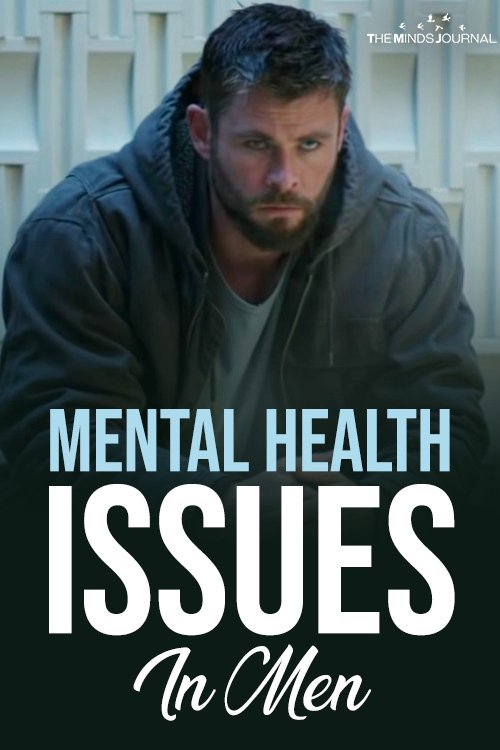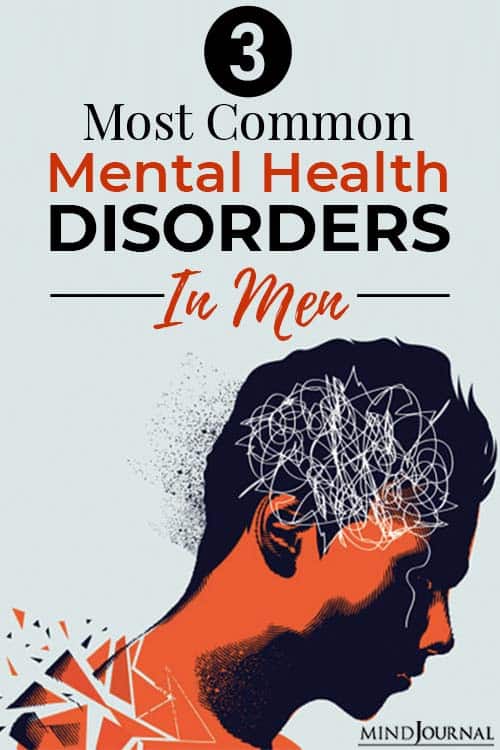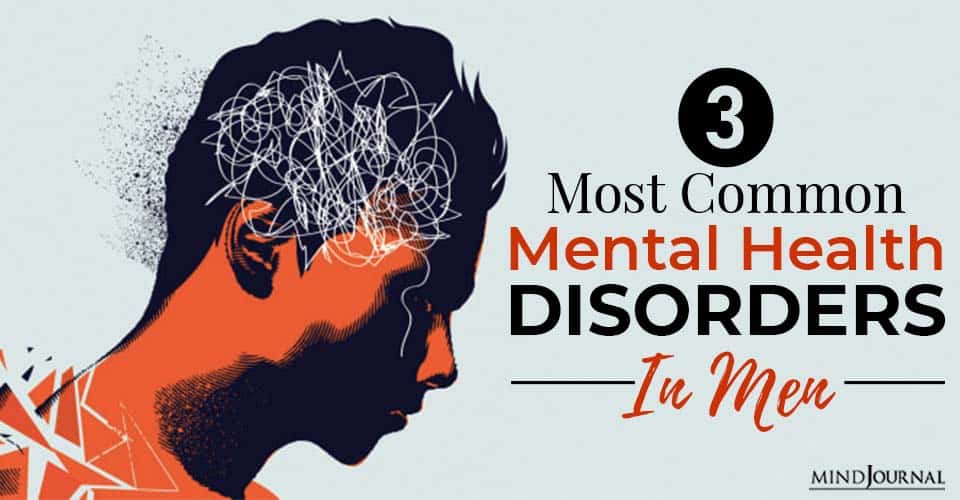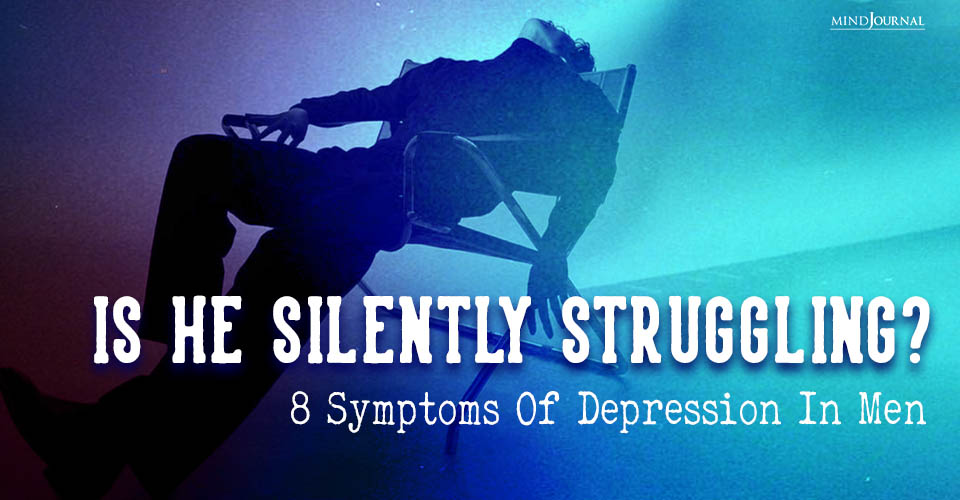Mental health disorders in men are more common than you think, even though most people tend to shy away from talking about it.
Mental disorders are a major challenge for anyone to cope with, especially when it comes to men.
Men are no different from it. They too suffer from depression, anxiety, and a range of mental health issues.
Hectic schedules, unwanted work pressure, familial responsibilities, limited earning opportunities, etc. add more to their stress level. It is said that men are made to feel weak by exhibiting their feelings.
Mental health experts believe that men are more prone to mental illness. The Men’s Health Forum stated that 4 in 5 suicides are by men, which is the biggest cause of death in men under 35.
Battling a mental illness takes resilience, strength, and willpower. So, if someone battling or has survived from cancer are heroes, then why not someone who recovered from mental illness is considered heroes?
The below infographic shows some of the most common mental health disorders in men.

Types of Mental Health Disorders in Men:
1. Depression
Depression affects human beings with a wide range of symptoms. These may include the consistent loss of interest and enjoyment, low mood, general sadness, difficulty falling asleep, feelings of guilt or low self-worth, eating pattern changes, exhaustion and a lack of concentration, etc. to name a few.
Imbalance in one of the brain chemicals named ‘Serotonin’ plays a vital role in the rise of depression like disorders.
Depression plays a negative role in disturbing a person’s life. Negative thoughts continue to rise inside human beings forcing them to attempt suicides as well. These are commonly diagnosed disorders affecting over 300 million people.
Related: Understanding Depression With Beck’s Cognitive Triad
Symptoms:
- Physical pain including back pain, joint pain, limb pain, etc.
- Feeling irritable and extremely grouchy.
- Drinking more alcohol than usual situations and giving silly reasons.
- Rapid weight loss or weight gain-like imbalances.
- Ignoring or forgetting the daily routines like forgetting to shower, improper brush timings, struggling to get out of the bed in the morning, etc.
- Inability to concentrate and making decisions for a purpose.
- Apologizing for every single thing and rising with a fear of guilt every day.
Treatment:
Depression must be treated on time for avoiding further life consequences.
The following natural therapies are found to be effective in chronic depression like situations:-
- Getting deeper inside a scheduled daily routine.
- Setting up day-to-day goals for yourself helps you get back on track.
- Performing regular exercise for boosting ‘endorphin’ hormones count.
- Eating healthy food on time including foods rich in omega-3 fatty acids and folic acids.
- Taking enough sleep and going to bed on time.
- Performing breath-up exercises including meditation and yoga.
Related: Studies Show How Yoga Will Help You Fight Depression
2. Anxiety
Anxiety-like mental disorder is commonly found in a person affected by depression and vice-versa. The issue arises from a multitude of factors, including brain chemistry, genetics, and life events that play a key role in a person’s life.
The issue if diagnosed on time can be cured without any difficulties. The treatment strategies including medication and psychotherapy play a vital role in helping to control and manage the symptoms of anxiety.
Symptoms:
- Excessive worries.
- Feeling agitated.
- Restlessness and fatigue.
- Difficulty concentrating.
- Tensed muscles.
- Irritability.
- Staying asleep or trouble falling.
- Avoiding social meetings and situations.
- Panic attacks.
- Irrational fears are leading to phobias of various kinds.
Treatment:
Anxiety may create difficulties in living life happily. The issue may lead to life threats if not treated on time.
The following natural ways work positively:-
- Consuming a healthy diet rich in fruits, vegetables, high-quality meats, nuts, fish, and whole grains.
- Quitting smoking to get rid of the anxiety rising factors.
- Consuming probiotics and fermented foods for increased mental health.
- Taking caffeine in limited quantity to limit anxiety disorders.
- Trying regular meditation and practicing yoga.
Finally, consuming a nutrient-rich diet, dropping psychoactive substances and implementing stress-management techniques can all help reduce symptoms of anxiety.
Related: 5 Ways to Ease Anxiety Naturally
3. Bipolar Affective Disorder
This mental health disorder in men results negatively in both the manic and depressive episodes.
Over 60 million people are under the grip of these deadly mental disorders resulting in an elevated or irritable mood, inflated self-esteem, hyperactivity, and a lack of desire to sleep.
Psychological support plays a crucial role in assisting the disorders and providing lifetime relief. It is better to understand the symptoms and diagnose the issue on time.
Symptoms:
- Lack of desire to sleep and unstable concentration on things.
- Consistent rise in the feelings of extreme sadness and hopelessness.
- Imbalances in a healthy mood, psychomotor activity, circadian rhythm, and cognition.
- Varying levels of mood disturbance ranging from dysphoria and irritability.
- Instant increase in the energy of psychomotor activities leading to rapid speech, the subjective feeling of rapid thoughts, unwanted social behavior, or impulsivity.
Treatment:
In case of the above-listed symptoms, a doctor’s advice is more than necessary.
The following treatment mechanisms must be taken care of:-
- Consulting psychiatry and practicing psychotherapy.
- Forming healthy relationships with the near and dear ones.
- Quitting drinking and consuming recreational drugs.
- Scheduling and maintaining a proper healthy routine.
- Eating without any carelessness, consuming sprouts, meditation, yoga, physical exercises, and sleeping regularly at least for 8 hours daily.
Related: Bipolar Disorder: 10 Facts You Should Know About It
To sum up, mental health in men may be dangerous if not diagnosed and treated on time.
Want to know more about mental health disorders in men? Check this vide out below!
In addition to the above, there remain several such disorders including Dementia, Schizophrenia and other psychoses leading to severe life difficulties.
Every single individual should remain positive with a ray of hope even under dark situations. Follow the appropriate daily routine, exercise regularly, meditate, sleep and enjoy your life to avoid such mental health disorders permanently.
Aditya works as a Growth Assistant at AirTract.Com, a social platform wherein people ask questions, write articles, share knowledge and experience. He has a Bachelor’s Degree in Computer Science Engineering and has been working in the field of Digital Marketing for the past two years. He is also a voracious reader and a big sports fan.
Written by Aditya S















Leave a Reply
You must be logged in to post a comment.